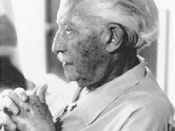Erik Erikson
Erik Erikson is most known for his theories about human development. Erikson is a Freudian ego-psychologist. Erickson generally agreed with what Freud was saying, but he added some of his own interpretation and a couple more stages to his theory. Erikson's theory consists of eight stages that start from the minute we welcomed in to the world, until the day that we leave it. Along with each of the eight stages, Erikson provided a description of the type of conflict and corresponding events that occur to individuals of that would reside in that age bracket or stage. Below is a short summary of each of Eriksons eight stages, and some simple interpretations of what each stages meanings;
StageAgesBasicConflictImportant EventSummary
1. Oral-Sensory Birth to 12 to 18 monthsTrust vs. Mistrust FeedingThe infant must form a first loving, trusting relationship with the caregiver, or develop a sense of mistrust.
2. Muscular-Anal18 monthsto 3 yearsAutonomy vs.Shame/DoubtToilet trainingThe child's energies are directed toward the development of physical skills, including walking, grasping, and rectal sphincter control. The child learns control but may develop shame and doubt if not handled well.
3. Locomotor3 to 6 yearsInitiative vs.Guilt IndependenceThe child continues to become more assertive and to take more initiative, but may be too forceful, leading to guilt feelings.
4. Latency6 to 12 yearsIndustry vs. InferioritySchoolThe child must deal with demands to learn new skills or risk a sense of inferiority, failure and incompetence.
5. Adolescence12 to 18 yearsIdentity vs. Role ConfusionPeer relationshipsThe teenager must achieve a sense of identity in occupation, sex roles, politics, and religion.
6. Young Adulthood19 to 40 yearsIntimacy vs.IsolationLove relationshipsThe young adult must develop intimate relationships or suffer feelings of isolation.
7. Middle Adulthood40 to 65 years Generativity vs. StagnationParentingEach adult must find some way to...



Good
Good defined and descriptive essay.
0 out of 0 people found this comment useful.